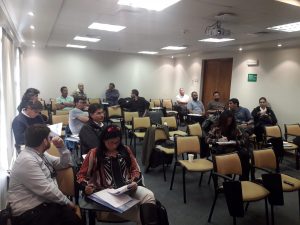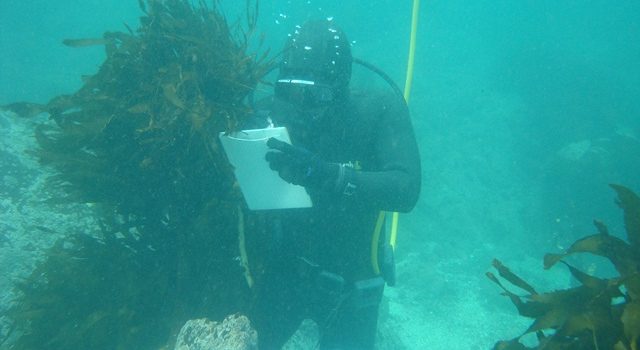IFOP conducts workshop on management areas
October 10th, 2017 The main opinions and results of this workshop will be incorporated in the Final Report
The main opinions and results of this workshop will be incorporated in the Final Report
In Coquimbo, the project “Fisheries Monitoring Program under Management Regimes 2016-2017”, conducted a workshop to analyze a proposal for assessments of benthic communities for standardization that are carried out in management areas (AMERB)
The activity was developed within the framework of the AMERB 2016 Follow-up project, where a standard methodological proposal was presented for the data collection and analysis of information of the ecological communities within the AMERB.
This proposal was built by IFOP Management Areas Section team and was assisted by Drs. Sergio Carrasco fom Universidad Catolica del Norte (UCN) and Alejandro Pérez Matus from Pontificia Universidad Catolica. (PUC).
In the workshop, the proposal for the establishment of 5 indicators that assess the state of the communities and their relationship with main species was discussed: eco-productive condition of a resource; Spatial coverage of communities. Community structure; Condition of species of ecological importance and Monitoring of species Sentinels; answering for each of them, the following questions: What is it ?; Why measure it ?; What data to collect and how to do it ?, and How to analyze and interpret the results?
It was suggested that these ecological indicators could help to monitor the changes in AMERB production, possibly reveal unwanted effects of the exploitation of resources, detect possible impacts of environmental deterioration and / or evaluate the potential effects of some catastrophic event.
Cristian Lopez, SERNAPESCA Regional Director, referred to the workshop “this region of Coquimbo is very important in what concerns management areas of; brown algae, locust, machas so everything that has to do with the subject is relevant, it is super opportune that after 20 years we can standardize databases subject and have macro backgrounds in that sense; so that resources are sustainable and continue to give high productivity in Coquimbo region ”
Álvaro Wilson, IFOP researcher, explained that “the main observations made by the attendees were related to the need for the administrator, before implementing data requirements and additional information to those currently in force, to consider: That there is an open disposition to take data and information standardization of benthic communities to the extent that they are useful to both users and the administrator. Although this type of information would help to make some management decisions at local level, in practice, this would be mainly in the interests of the administrator (Undersecretariat of Fisheries and Aquaculture). To carry out a general review of the amounts and financing mechanisms to which the users have access to solve AMERB studies, since they consider that in general their low amounts undermine the quality of the same. To improve administrative management related to AMERB operation and management .
Finally, it was agreed that the positive effect of the implementation of standard ecological monitoring in AMERB is that it could make available in the medium term a databases and useful information for both direct users (local scale) and for scientists and researchers which, if complemented by a monitoring network that includes free access zones and protected areas (representative of ecoregions), would allow not only a better understanding of the benthic system, but also would facilitate managers to make management decisions with an ecosystemic approach on all or most of the small-scale fisheries being developed in these areas. “
